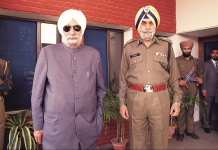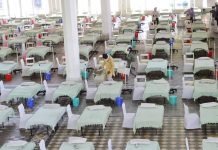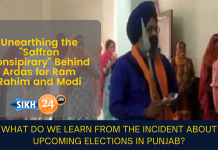The Punjab government has enriched private transport companies – most of which are owned by the Badals – while the state transport department collapses.



Elections are around the corner in Punjab and in its final move, the incumbent Badal government has discreetly initiated a process of extending route permits and enhancing operational schedules of private bus transporters at the cost of state-run transport buses, whose operational timings are being cut and permits taken away.
This move is one in a series of manipulations over the past few years of the state transport policy that favours private transportation agencies at the cost of the the state-owned transport department and the people of Punjab.
The attempt to enrich private transporters does not come as a surprise since the father-son duo of Punjab chief minister and deputy chief minister, Parkash Badal and Sukhbir Badal, directly own over 60% of the state’s private bus services. The business, which began with 10 buses in 2007, now runs over a thousand buses including a few hundred luxury coaches.
The family most recently acquired two more private transport agencies based out of Hoshiarpur – Rajdhani Express and Azad Hoshiarpur – and with it added another 120 buses to their already swollen kitty.
The other companies of the Badal clan have also applied for an extension of routes and increase in daily trips in the area. Interestingly, the state transport commissioner, on the other hand, has curtailed the operational time of state transport buses originating from Hoshiarpur by over 700 minutes.
A labyrinth of Badal’s transportation companies
The Badals have built a gigantic business empire with interests cutting across various sectors – transportation, media, liquor, hospitality and non-conventional energy, amongst others. In fact, in the road transport business alone, they control at least six different companies with annual revenue running into a few 100 crores. The businesses are orchestrated through a small group of family loyalists who hold top positions in their business ventures.
The flagship company of the Badals – Orbit Transport – quite literally acquired wings after it merged into Orbit Aviation, a company which was incorporated only three months after the Akali-BJP government came to power in the state in 2007. The directors of the company include Sukhbir’s brother-in-law, Gurmehar Majithia, and two other family loyalists, Mohammad Jameel and Mohammad Rafiq. In 2012, Sukhbir’s holding company, Orbit Resorts Pvt. Ltd – which runs several five-star hotels – acquired control over it and now owns a majority of the shareholdings. Orbit Aviation is the leading private transporter in the state today with the most number of route permits and buses.
Interestingly, the brother duo of Jameel and Rafiq also appear as directors in the Badal-owned Dabwali Transport Company Limited. While Sukhbir owns a majority stake in the company of 99.74%, other family related businesses are investors in it.
Documents from the Ministry of Corporate Affairs reveal that when combined with Orbit, the two companies earned an annual revenue of over Rs 150 crores in the last financial year. Jameel and Rafiq also appear as directors in at least 10 other business ventures operated by the Badals.
Another company controlled by the Badals is Taj Travels, that runs luxurious Mercedes Benz coaches in the state. The majority shareholding of the company is by another family loyalist, Lakhvir Singh (97%). He and one Jagpal Singh appear as the directors of the company.
Not only does the balance sheet of Taj Travels feature the private residence of Badals and land in Badal village as the fixed assets of the company, there is also clear evidence of multiple financial transactions of the company with other business ventures of the Badals.
Lakhvir and Jagpal are directors in two other major transport companies – Shan-e-Punjab Transport and Hargobind Travels – that are also backed by the Badal family. The two of them also appear as directors in other business ventures of the family including the recently acquired Indo-Canadian Transport Company which enjoys a monopoly service to the Indira Gandhi International Airport in Delhi.
The establishment of this monopoly is an intriguing story in itself. Indo-Canadian Transport has been profiting from a route which was marked as ‘non-viable’ by the state government in 2012. The government-owned Punjab Roadways initially began the service in 2010 to connect the NRI-rich Doaba region of Punjab with Delhi airport. The Volvo buses belonging to the state were, however, hastily withdrawn from service – leaving Indo-Canadian as the sole player.
This decision left everyone baffled because not only was the route popular among passengers but the transport department was also making a good profit from it.
Allegations from the Punjab Roadways Employee Union and Punjab Government Transport Workers Union suggest that the transport department was forced to withdraw its services after the Badals took over ownership of Indo-Canadian Transport Company in 2012.
The popularity of the route can be assessed from the fact that Indo-Canadian plies over 10 buses on the route every day. While Punjab Roadways charged a nominal Rs 650 for a single ticket, the private company jacked up the fare to Rs 2600. The passengers were left with no other option but to shell out the extra money.
Tweaking state transport policy to benefit private operators
The Badals have often manipulated rules and used government machinery to consolidate their clan’s business empire. Three months after coming to power in March 2007, the Akali-BJP government started issuing permits for luxury buses to several private companies, including many of their own operators.
Three months later, in November, the government relaxed the taxation structure for the transport industry. The new tax policy, however, had the oddest of anomalies – the costlier the bus, the lower the tax to be paid.
While the passenger fare of luxury buses was double that of the ordinary buses, the formula of calculating the Motor Vehicle Tax (MVT) was contrary to it. The MVT on ordinary buses was reduced by a mere 25 paise to Rs 2.25 per vehicle per km, but the tax on luxury coaches was reduced from Rs 7 to a mere 50 paisa per vehicle per km – a 93% drop in the tax rates.
Furthermore, luxury buses were given a tax exemption for 150 days, compared to a 50-day tax exemption for the regular ones. The disproportionate cut in the tax rate shifted the revenue from the state transport department – which owned a majority of regular buses – to the private transporters who operated most of the luxury buses. The demand for luxury travel multiplied in the state because of the steep fall in ticket prices.
The buses of the Badal family also enjoy preferential treatment in terms of prime routes and timings. A driver of a bus operated by the state-run Punjab Roadways, who did not wish to be identified, accused the private operators backed by ‘political rulers’ of muscling into the timetable to obtain the best timings during the peak hours. He also revealed that the timings were manipulated to ensure that these private operators get more time to sell tickets at the counter.
A perusal of the timetable reveals the manner in which state transport buses are scheduled before and after private buses. State transport sources say it is an open secret that the two government buses would invariably fail to show up on time, hence giving more time to the private operators at the counters. Master Mohan Lal, when he was the transport minister in the Badal government, not only admitted to such practices but also alleged that the crew of many state-owned buses colluded with private operators in missing schedule timings and carrying a low passenger load.
In fact, it is a common scenario at the bus stands in Punjab that while a government bus would get only a two to four minutes stop at the bus counter, buses owned by the Badals were allowed to wait until filled to capacity. A few other drivers also complained of musclemen being employed by private operators to ‘hijack’ passengers from government buses to the private ones.
The presumptuousness of the Badal family
It has become an unwritten rule in Punjab that the police will not register an FIR against a bus operated by the Badal family even in cases of grave offences. In May, the Punjab police refused to file a complaint against the driver and conductor of an Orbit Aviation bus when a 13-year-girl died allegedly after being raped inside the bus in Moga.
After a media furore, the police was forced to act; however, the Badals ensured that the family members of the victim turned hostile in court. This should not come as a surprise considering the fact that the Badals were able to turn 137 witnesses hostile in a disproportionate asset case filed against them in 2010.
The government has also adopted several other mechanisms to wreck the state transport machinery. An amount of Rs 43 crores was allocated to start 225 new buses during the annual budget this year, however, not a single penny has been released till date. Surinder Singh, the convener of the Punjab Roadways Employees Joint Action Committee, recently mentioned that the state transport department was left with only 1,690 buses against the minimum fleet of 2,404 buses guaranteed by the Punjab government.
Delays in the introduction of railway links between major cities of Punjab have also been blamed on the powerful bus transport lobby. For instance, 30 years after the work first started, the government has failed to connect the hundred kilometres between Ludhiana and Chandigarh. Other important missing rail links include Bathinda-Amritsar, Barnala-Mansa and Amritsar-Anandpur Sahib. In the absence of railway connectivity, people are forced to travel by buses that are not only more expensive but also relatively unsafe and uncomfortable.
Private operators have further exploited the loopholes in the current transport policy to access the more profitable routes of the state transport department. A common strategy is to pick multiple permits for shorter routes and later tweak the rules to get them transformed into a longer and more profitable permit.
Many government drivers and conductors told this writer that the powerful private operators evade taxes and mandatory charges and operate multiple buses on a single permit. An investigation by a Punjabi news channel, Day and Night News, also revealed that several private buses were run on the names of indigent persons who neither had the information nor the resources for the same.
The systematic manipulation of Punjab’s transport policy by the Badal government over the years has resulted in a remarkable growth for private transporters while leading to a structured collapse of the government transport department. Not only has the state department suffered a drop in the total kilometres traversed by their fleet but it also saw a fall in the number of permits and buses owned. Although the department faces an accumulated loss of over Rs 460 crores today, the real loser has been the common public, at the cost of whom the coffers of a few are being filled.
Lovish Garg is a student at the NALSAR University of Law, Hyderabad.





Lot of Business opportunities for the Badal Family
1) Set up a Stock Exchange
2) Tele Communications
3) Retailing
4) Transports on land by Taxis ,Trucks ,Buses ,electric cars ,Buses
5) Transport by water by Ships and Submarines
6) Transport by Air with air lines ,Helicopters and Drones
7) Transport by SPACE in space ships and Space stations
8) Education by school ,colleges and Universities
9) Industries of all types .
10) Entertainment by making movies ,
11) Multi Specialty Hospitals
12) Hotels
13) Research Labs
14) Internet Business
15) Banking network including online Banking
16) Energy sources like Sun ,winds ,batteries.
17) Artificial Intelligence including Robotics
18) Animal industry like Milk ,eggs ,honey etc etc
19) Construction industry
20) Hospital and drug manufacturing
21) Security industry.
etc etc
Yes he is our Warren Buffet.
I think you meant to say ‘Warren Buffett’. A Buffet is a system of serving meals in which food is placed in a public area often in institutional settings where the diners generally help themselves to as much as they want … Hang on self-serving from public areas, consume as much as you can because you are not personally paying the bill..? Maybe you were right the first time he is you Warren ‘Buffet’ after all.
Sir Badal and family need to expand there business into other area to like
1) Education : School, colleges,Universities
2) Industries of different types
3) Tourism
4) IT
etc etc
etc etc
6)
I am afraid like your tenuous grasp of history you have not quite understood simple economics. A private monopoly which controls all infrastructure and is accountable to nobody leads to corruption and nepotism. Increased competition leads to improved efficiency and lower prices and makes corruption more difficult. Oh, wait a minute, I see now why you just want the Badals to possess everthing…
What is needed is a healthy mix of pvt and Public ownership of Transport business.
The Badal family how ever need to expand there transport business to include
1) SHIPS
2) AIRLINES
3) SPACE STATIONS and Space Ships.
Right so you want to increase the Badals monopoly stranglehold on public transport because in your world that will increase competition and reduce corruption? Yes and monkeys can fly. But then again you believe that too…